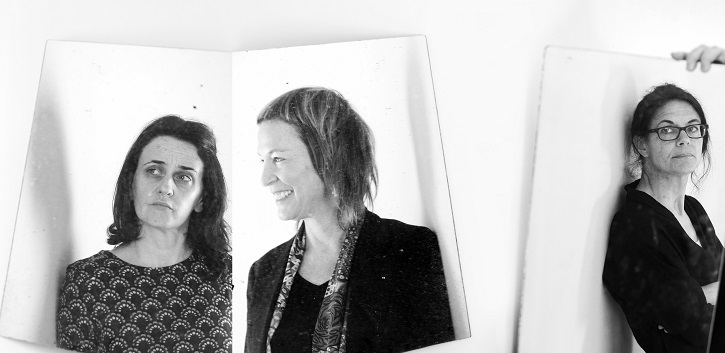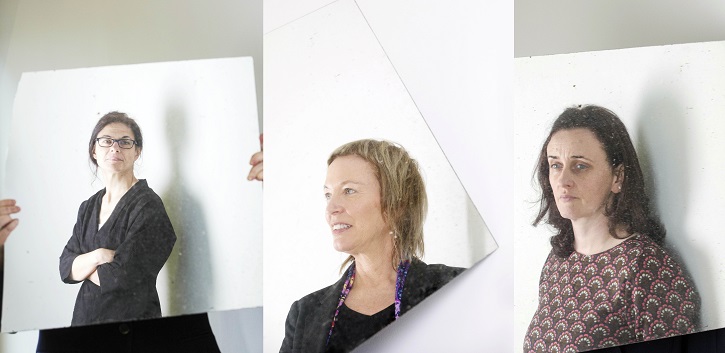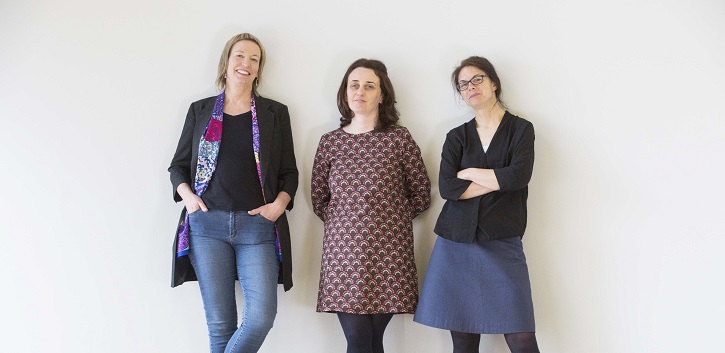Long read: Space for ideas to breathe

By Graham Clifford
Is this it? Is the man-made scaffolding around which modern society is built set in stone? Must we forever swim through a sea of simplistic analysis, formulaic discussion, and perceived norms taking care to take the safe options and not deviate from a well-worn path? Careful not to question, not to imagine, not to find an alternative? Or is there another way?
Well, in a new and exciting series from Cork University Press that encouragement to reimagine another Ireland and another world is embraced, emboldened, and explored.
Síreacht: Longings for another Ireland is a series of short, topical, and provocative texts on controversial contemporary issues ranging from Freedom to Commemoration and the Public Sphere.
Over coffee, the series editors Órla O’Donovan, Rosie Meade and Fiona Dukelow explain the background to the series and what they’re hoping it will achieve.
The trio from UCC's School of Applied Social Studies has collaborated on something truly special, sourcing authors whose style will connect with much more than just an academic audience.
“We didn’t want this series to just comprise commentaries on contemporary Ireland,” explains Órla O’Donovan.
“We wanted to ensure it went beyond critique. Of course, we understand the importance of critique, but we felt that sometimes that can be overwhelming. We wanted to look at how things might be different? So, we were interested in booklets that were unapologetically utopian. A refusal of the idea that there’s no alternative but also, we told the authors they didn’t have to adhere to this idea of balance in academic writing. We encouraged the authors to take a position, and we are thrilled with the outcome," she tells me with the quiver of excitement in her voice.
But why the title ‘Síreacht’? “We can thank John Carey of UCC’s Irish Department for that. Síreacht refers to yearnings such as those evoked by the music of the aos sí, the supernatural people of Irish mythology. At the heart of the mythology of the sí is the belief that laying beneath this world is the other world. So, it focuses on re-imagining, finding an alternative, seeing things differently. The Hawthorn tree on the cover was chosen because in mythology it represents passage to the beyond.”
And in a contemporary context, there may well be a subliminal yearning suppressed in a world filled with noise, artificial light, aggression, and a relentless thirst for immediate satisfaction. A commoditised world where free thought is not generally encouraged.
Rosie Meade tells me more:
“There is, what we would see as, a poverty of intellectual debate in mainstream Ireland. If you go on most of the radio or television channels where issues of the day are being discussed, there's quite a narrow range of viewpoints offered, and the spectrum of possibility is very constrained. We wanted to bring together a diverse range of topics, so it’s not just about social sciences. We want to keep it broad because often with academic writing it's very disciplinary – you write as a social scientist or biologist or whatever it is.”
Rosie continues: “One of the motivations for bringing Síreacht to fruition was to give space for ideas that would be considered marginal, peripheral, trivialised or demonised. Giving them a space in which to breathe, but making that cheap, portable and accessible so that people will buy these books and engage with them as well.”
At €9.95 each, these books of 35,000 words pack a punch.

Fiona Dukelow explains why a series such as this is so needed right now. “With issues such as extreme inequality, the stranglehold the ‘1%’ has on global politics and economics, the dominance of ‘fiscal discipline’ and lack of democracy in the EU, oceans full of plastic and a planet that’s rapidly heating up, it’s easy to succumb to pessimistic thinking about the future of our societies and the idea that any discussion of utopian thinking and alternative ideas and forms of action is a hopeless and hapless exercise in the face of such challenges.”
Events since the global financial crisis of 2008 reinforce that pessimistic thinking since it seems that those who claimed ‘there is no alternative' have retained their power and neoliberal ideas about how to manage economies remain dominant despite clearly being against the interests of the majority of people. Such pessimism is brilliantly captured by the phrase used by theorists Fredric Jameson and Slavoj Žižek that ‘it is easier to imagine the end of the world than it is to imagine the end of capitalism'.”
The first three books in the series focus on ‘Freedom?’ written by Kevin Ryan and Fiona Whelan under the collaborative name ‘Two Fuse’, on Commemoration by Heather Laird, lecturer in the School of English at UCC and on the Public Sphere, penned by Harry Browne, Senior Lecturer in DIT’s School of Media.
The series will continue indefinitely filling a vacuum created when the tablet series Undercurrents published by the Cork University Press finished over a decade ago.
Already there are plans for texts on issues such as trade unions, our relationship with money and the treatment of animals. Everything is on the table from the privatisation of seaweed farming to our treatment of time.
And though utopian in nature, the books are grounded in reality. They dance between what we know and what we can imagine. But they are, by no means, preachy edicts promising eternal salvation, as Rosie Meade elaborates:
“What our authors are offering is not some kind of blueprint, not a 10-point plan for how Ireland could be better. This is about actually saying ideas are important – recognising that things are tricky and there are lots of influences, but the public sphere should be about this kind of discussion. Despite the communication overload that people are experiencing today, such a place does not exist, and imagination becomes costed, evidence-based and outcome-driven.”
She continues: “As in our wonderful book on ‘Commemoration’ we can change the way we look at things. To stop thinking back, to understand that nothing is inevitable. And to ponder what other paths might have been taken in the past if the outcomes had been different. The present and the future are not inevitable either, but modern society perceives that it is. We must put up the hand and not be afraid to ask the question, to seek alternatives.”
And Fiona Dukelow concurs: “Discussion of radical thinking and alternative ideas can very easily get hemmed in and weighed down by the limits of thinking regarding practical, pragmatic, realistic ‘solutions'. With this series we hope to expand those limits and put thinking and questioning, that's not only radical but also hopeful, at the heart of what a university does in the social sciences and how it contributes to social change.”
And through such reimagining, it's hoped readers will question why things are the way we are. In law, in societal norms, in their interpersonal relationships, in the media….
“Like what constitutes ‘news’ is very much focused on personalities, big institutions, and political parties," says Rosie. She adds: "In Ireland, things often only become news when a politician addresses them verbally – why? Those news stories then become self-reproducing, and it means a lot of other perspectives don’t get out there. Like, take Trump, for example, because of all the time spent watching him, reporting on him and revealing his shenanigans the focus is taken away from all the other things happening in the United States and elsewhere. Shouldn't we look at that seriously?"

Órla points out there are exceptions: “The protest against water charges in recent years showed that there is another way. Also, the survivors of the Mother and Baby Homes weren't willing to be quiet. They were the exceptions to the rule.”
Little books tackling big issues and written in a conversational, accessible style, the Síreacht series will trigger wider discussion within the walls of educational institutions but far outside them too. Rarely has such a high quality, thought-provoking, humour-filled, well-argued and well-written series been so accessible to so many for, relatively, so little cost.
The editors of the Síreacht series, Órla O’Donovan, o.odonovan@ucc.ie; Fiona Dukelow, f.dukelow@ucc.ie and Rosie Meade, r.meade@ucc.ie welcome suggestions or proposals for consideration as future titles in the series.
Freedom?, Commemoration and Public Sphere are available to purchase online. For more information, see Sireacht.ie.
Journalist Susan McKay will launch the series tomorrow (May 16) at UCC’s Staff Common Room at 5pm, after she delivers a seminar on the ‘Politics of the Belfast Rape Trial’ at 4pm in West Wing 9, UCC.
For more on this story contact:
Lynne Nolan, Media & PR Officer, University College Cork on 087 210 1119 or lynne.nolan@ucc.ie.
